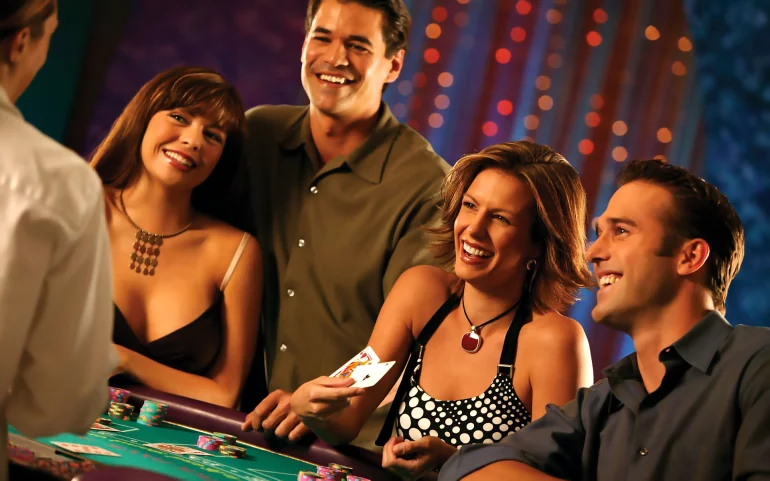
To fully understand the process of playing blackjack, you must understand all its odds. It is critical to know how the casino gets its advantage and how it helps it win. Oh, and it's interesting to know the chances that you will be dealt the right card or blackjack. Below is information about the probability of different situations in blackjack.
The average advantage a casino has in blackjack is believed to be up to eight percent. The dealer is the last to draw cards when many players have already dropped out. Of course, we are talking about non-professional visitors who rely on their own experience and premonitions during the game.
Experienced gamblers who play by the basic strategy can reduce the casino's advantage to 0.5%.
If you successfully learn and practice one of the card counting systems, you may even be able to tilt the mathematical advantage in your favor. That's why card counters are usually banished from most casinos.
To better understand the principles behind basic blackjack strategy, let's look at the probability of some situations.
| Name | Soft | Return to player | ||
|
|
99.78% | |||
|
|
99.71% | |||
|
|
99.7% | |||
|
|
99.69% | |||
|
|
99.65% | |||
|
|
99.6% | |||
|
|
99.59% | |||
|
|
99.54% | |||
|
|
99.54% | |||
|
|
99.54% |
The Probability of Busting after Hitting a Card
It's not unreasonable to realize how high the chances of overcalling twenty-one are when you have a certain number of points in your hand. The table below gives approximate figures valid for a situation where the shoe has just started. If, for example, all the hands have tens, then these figures are unlikely to be correct for the next hand, because there is an uneven number of cards of different values in the game.
Naturally, if you have eleven or fewer points in your hand, you cannot bust by hitting one card, so the chances of busting are equal to zero. Accordingly, if you have twenty-one, any card taken will lead to busting.
Explore the following table.
Probability of overcalling when a card is dealt| Number of points on hand | Probability of busting after hitting a card |
| 11 or less | 0% |
| 12 | 31% |
| 13 | 39% |
| 14 | 56% |
| 15 | 58% |
| 16 | 62% |
| 17 | 69% |
| 18 | 77% |
| 19 | 85% |
| 20 | 92% |
| 21 | 100% |
Frequency of Getting a Certain Number of Points in the First Two Cards
The statistics of dealing the first two cards a player receives can be pretty curious. The table shows the probability of having the natural blackjack, hard hands, and soft combinations.
Note that the natural blackjack is dealt only 4.8% of the time, and the cards that come up most often are the ones where you must take some sort of active action.
It is common for a player to get seventeen to twenty points, which means a good chance of winning. It's also quite typical to get cards that, if you add one more card to them, you won't get more than twenty-one points.
| Points in the first two cards | Probability |
| 21 (blackjack) | 4,8% |
| 17 - 20 | 30% |
| 12 - 16 | 38,7% |
| Busting is impossible | 26,5% |
| Total | 100% |
Odds of the Dealer Busting and the Player Winning
The following table shows the dealer's odds of overcalling and the player's advantage depending on the card revealed.
- The first column demonstrates the cards the dealer can have.
- The second column shows the dealer's odds of busting.
- The third column displays the player's odds of winning in each situation.
As you can see, the dealer's highest odds of busting occur if their card is a five. Note that the dealer is likelier to win if the card is a ten. In this case, the player's chances of winning are minimal.
| Dealer's card | Dealer's odds of busting | Player's odds of winning |
| 2 | 35,30% | 9,8% |
| 3 | 37,56% | 13,4% |
| 4 | 40,28% | 18,0% |
| 5 | 42,89% | 23,2% |
| 6 | 42,08% | 23,9% |
| 7 | 25,99% | 14,3% |
| 8 | 23,86% | 5,4% |
| 9 | 23,34% | -4,3% |
| 10 | 21,43% | -16,9% |
| J | 21,43% | -16,9% |
| Q | 21,43% | -16,9% |
| K | 21,43% | -16,9% |
| A | 11,65% | -16,0% |
The Number of Decks and the House Edge
Blackjack is played with fifty-two cards, but the number of decks in different games can vary. Below is a table that tracks how the house edge changes depending on the number of decks in play.
As you can see, it is most profitable to play single-deck blackjack, and the eight-deck variant is the hardest to play.
The difference between these numbers may seem small, but any experienced blackjack player knows the value of every hundredth of a percent in the long run. Therefore, it is necessary to take into account the slightest advantage and be able to use it.
It is also worth noting that if the rules are different in different game versions, these figures will also change.
| Number of decks | House edge |
| One deck | 0,04% |
| Two decks | 0,42% |
| Four decks | 0,61% |
| Six decks | 0,67% |
| Eight decks | 0,70% |
How the House Edge Changes after Certain Cards Leave the Deck
The following table shows how your chances of winning change after certain cards come out of the deck.
This is a fundamental fact about card counting. To maximize your card counting efficiency, you must consider the slightest changes in the odds with each card leaving the shoe.
As you can see from this table, your odds of winning increase as low cards come out. When the high cards are dealt, however, the opposite happens. Your chances start to decrease. In the process, you will see that your score will get smaller as high cards come out.
You can only guess how difficult it is to keep these numbers in your head and keep score at the same time. Your brain has to be like a computer to do these two operations at the same time. However, advantage players can perform such miracles, making them perfect counters. Of course, keeping track of the odds is much easier when the game is played with only one deck.
For example, if you see several cards on the table, you can calculate how much your advantage decreases or increases. If many low cards have been dealt, the probability of you winning the next hand increases dramatically, and vice versa.
Such calculations must be done from the beginning of the deck or the shoe. Otherwise, they are almost meaningless. In addition, these figures are average, and even a very high percentage of probability for the player does not guarantee victory in the next hand, because of the volatility.
| Card dealt | Impact on the odds of winning |
| 2 | 0.40% |
| 3 | 0,43% |
| 4 | 0,52% |
| 5 | 0,67% |
| 6 | 0,45% |
| 7 | 0,30% |
| 8 | 0,01% |
| 9 | -0,15% |
| 10 | -0,51% |
| J | -0,51% |
| Q | -0,51% |
| K | -0,51% |
| A | -0,59% |
The Odds of the Dealer's Final Hand
Now let's talk about the odds of the dealer forming a particular final combination of cards. As a general rule of thumb in blackjack, the dealer must draw a card at sixteen and stop at seventeen points. These rules can vary slightly in some game varieties, but we'll go with the classic version.
As you can see from the table, the dealer busts more than twenty-eight percent of the time. If this does not happen, the croupier usually has twenty points, and his chances of a blackjack are the same as the player's —4.8%.
| Dealer's Hand | Hand Probability |
| Natural lackjack | 4,82% |
| 21 (of three or more cards) | 7,36% |
| 20 | 17,58% |
| 19 | 13,48% |
| 18 | 13,81% |
| 17 | 14,58% |
| Busting | 28,37% |
We hope that this information, if not even practically useful, will help you to understand more deeply and fully a complex and exciting game like blackjack.
How well do you play blackjack? Do you know the basic strategy? Do you use it in practice? Know how to count cards in blackjack? Do you know any other techniques for playing professionally?
Share your experiences with Casinoz readers. Tell us how to beat casinos at blackjack more often. Your feedback and opinions will be helpful to other enthusiasts.



































